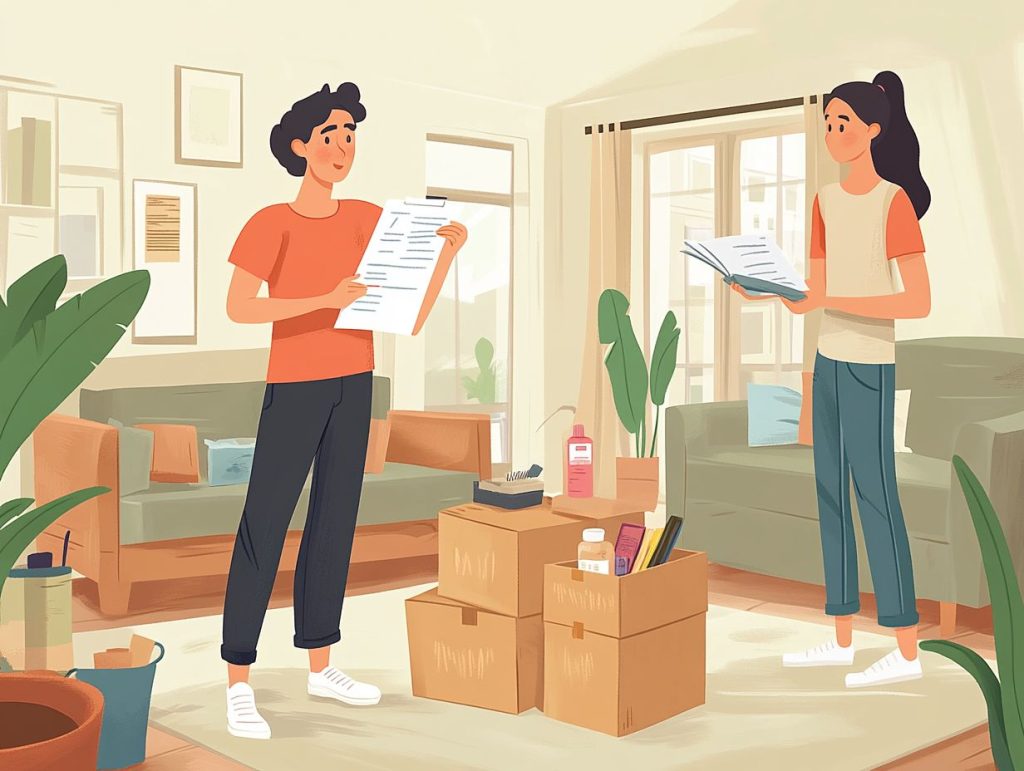Landlord Expectations: How Clean Is ‘Clean Enough’?
Rental agreements can be tricky, especially when understanding what landlords expect from their tenants. One of the most common points of contention is cleanliness—what does ‘clean enough’ really mean?
This article breaks down the nuances of landlord expectations, explores the benefits of meeting those standards, and highlights areas where disagreements often arise. It offers practical tips for maintaining a harmonious relationship with your landlord and insights into the consequences of not meeting their expectations.

Understanding Landlord Expectations
Understanding landlord expectations is key for tenants and landlords, as it lays the groundwork for a smooth rental relationship. Landlords usually have specific ideas about how they want their rental properties to be treated, such as keeping things clean, maintaining the property, and adhering to tenancy agreements. These expectations impact tenant satisfaction and even the value of the property.
For you as a tenant, getting a grasp on these expectations helps you meet your landlord’s requirements and protects your rights and responsibilities as outlined in the tenancy agreement. That’s why keeping the lines of communication open with your landlord is essential—it helps you navigate these expectations without any problems.
Defining ‘Clean Enough’
Defining what “clean enough” means in rental properties can feel entirely subjective and usually varies between landlords and tenants. Generally, cleanliness criteria cover surface and deep cleaning to meet the agreed-upon standards, ensuring the property is ready for new tenants and remains in good condition throughout the tenancy.
This includes vacuuming carpets, dusting surfaces, and thoroughly cleaning kitchens and bathrooms. Surface cleaning might involve wiping down work surfaces and mopping the floors, while deep cleaning could entail scrubbing grout and cleaning appliances inside and out.
Specificating these standards in the tenancy agreements is a sensible idea to keep expectations clear and avoid potential disputes. This way, both parties can agree on what cleanliness looks like and outline specific responsibilities that can be checked during move-in and move-out inspections.
Importance of Meeting Landlord Expectations
Meeting your landlord’s expectations makes a difference in keeping you and them happy while maintaining the property’s value over time. Doing your part—such as keeping things tidy and adhering to the tenancy agreements—leads to smoother property inspections and reduces the chances of tenancy violations.
Furthermore, when you and your landlord agree, it helps you comply with those regulatory housing laws, creating a more positive rental experience overall.
Benefits for Tenants and Landlords
The benefits of meeting landlord expectations aren’t just one-sided; they create a win-win situation for you and your landlord in property management. For you as a tenant, keeping up with cleanliness and maintenance can lead to a much better living environment. Meanwhile, landlords enjoy peace of mind and lower turnover rates, which helps preserve their property value.
When you actively keep your space tidy and report maintenance issues promptly, you’re not just looking out for yourself—you’re helping build a sense of community and pride in your living conditions. For instance, if you regularly clean the common areas, you’re enhancing your own space and making the place more inviting for your neighbours.
On the landlord’s side, when they prioritise responsive communication and timely repairs, they can significantly boost your satisfaction as a tenant. This often results in longer leases and fewer vacancies. Think about it: if a landlord jumps on quick plumbing repairs, you’re more likely to appreciate that and choose to renew your lease instead of looking for other options.
In the end, effective property management fosters a cycle of mutual respect and shared responsibility, benefiting everyone involved.

Common Areas of Disagreement
You’ll often find that common areas of disagreement between landlords and tenants arise because of differing perceptions of cleanliness and property condition. These cleanliness disputes can create misunderstandings about what tenants are responsible for and what landlords expect.
If you don’t clarify these matters, it could lead to tenancy violations further down the line.
Areas Where Tenants May Fall Short
Sometimes, tenants might fail to fulfil their responsibilities, especially regarding cleanliness and property upkeep. Common slip-ups include forgetting to meet move-out cleaning standards or not adhering to a cleaning checklist, which can lead to disputes and affect that all-important tenancy deposit.
It’s crucial to realise that keeping up with rental property maintenance meets the landlord’s expectations and enhances your overall living experience. For example, if you overlook kitchen appliances, bathroom fittings, and flooring, grime can build up, making it much harder to thoroughly clean.
Creating a detailed cleaning checklist can be a game changer in avoiding these pitfalls. It helps you stay organised and ensures no corner is left untouched.
If the thought of meeting those high cleaning standards stresses you out—especially before move-out inspections—consider hiring professional cleaning services. These proactive steps can help protect your deposit and build a better relationship with your landlord.
Areas Where Landlords May Have Unreasonable Expectations
Landlords have the right to set expectations, but sometimes, those standards can be a bit much, straining the tenant-landlord relationship. For example, you can feel frustrated and dissatisfied if they have overly detailed cleaning protocols or unrealistic sanitisation practices during property inspections.
And let’s be honest—it can add to the tension when they expect you to be available for routine inspections at inconvenient times. These excessive demands can undermine your sense of home and even lead to some serious resentment.
That’s why open communication is so important. When there’s space for constructive feedback, you can voice your concerns, which helps create a more harmonious relationship. If landlords are willing to listen and adjust their expectations based on what tenants share, it can cut down on friction and make your living experience a whole lot better.
Tips for Meeting Landlord Expectations
Meeting your landlord’s expectations doesn’t have to feel overwhelming. Effective cleaning techniques and open communication can help you stay on track.
By grasping and following the established cleaning protocols and property maintenance guidelines, you can ensure your rental property remains up to standard with your landlord’s cleanliness expectations.
Effective Cleaning Techniques
Effective cleaning techniques are key for keeping your rental property in tip-top shape and meeting your landlord’s expectations. Choosing the right cleaning supplies and setting up a regular cleaning schedule ensures that surface and deep cleaning are done properly.
Surface cleaning is all about ensuring visible areas—think worktops, floors, and appliances—stay dust-free and hygienic. On the other hand, deep cleaning dives into the nooks and crannies, like behind appliances and inside cupboards, to boost overall sanitation.
To get the best results, it’s wise to use specialised cleaning agents that easily tackle different surfaces and stains. A multi-surface cleaner can make everyday tasks a breeze, while a stronger disinfectant is essential for those high-touch areas.
Creating a cleaning schedule keeps you organised and ensures that every cleaning technique is applied consistently, which helps enhance the property’s appeal and meet cleanliness standards.
Communication with Landlord
Open and effective communication with your landlord is key to building a positive rental relationship. When you actively engage in discussions, you can share feedback about the property and clarify any uncertainties regarding your tenancy agreement, which helps reduce the chances of misunderstandings.
These conversations foster trust and create a collaborative atmosphere where you and your landlord can express your needs and expectations. To strengthen this relationship, consider setting up regular check-ins, especially before and after property inspections, to discuss any concerns or observations you may have.
When issues arise, addressing them amicably through constructive discussions can lead to quick resolutions and prevent further complications later on. Additionally, encouraging your landlord to seek your feedback on property management practices ensures that both of you feel heard and valued. This proactive approach promotes a respectful partnership that benefits everyone involved.
Consequences of Not Meeting Landlord Expectations
Failure to meet your landlord’s expectations can lead to serious consequences, such as potential penalties or, in extreme cases, even eviction.
Tenancy violations—such as not keeping the property clean or failing to maintain it—can jeopardise your living situation. Additionally, they can harm your tenant rights and interfere with your future rental opportunities.
Possible Penalties and Solutions
Possible penalties for not meeting landlord expectations can throw a spanner in the works, ranging from losing part or all of your security deposit to facing eviction. Understanding your tenant rights and keeping the lines of communication open with your landlord can often lead to solutions that help you sidestep severe consequences.
Communicating any challenges you’re facing in sticking to tenancy terms can encourage a more empathetic response from property owners. For example, if you’re dealing with late rent payments due to unexpected circumstances, discussing it with them might lead to negotiated payment plans instead of harsh penalties.
Keeping a record of all your communications and requests can offer clarity and peace of mind if disputes arise. By taking proactive steps—like checking in with your landlord regularly or volunteering to handle minor maintenance issues—you can build a cooperative relationship that enhances your living situation and reduces the risk of conflicts.


